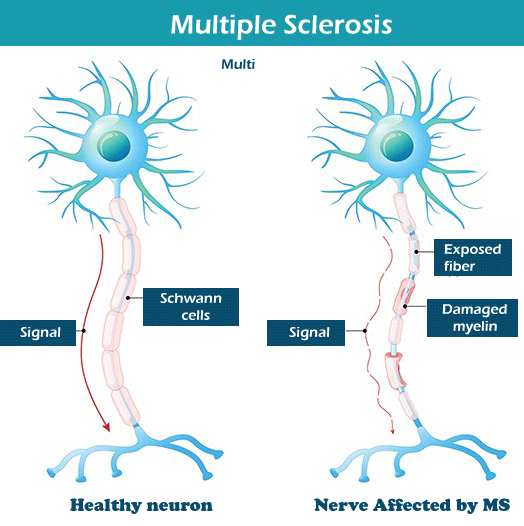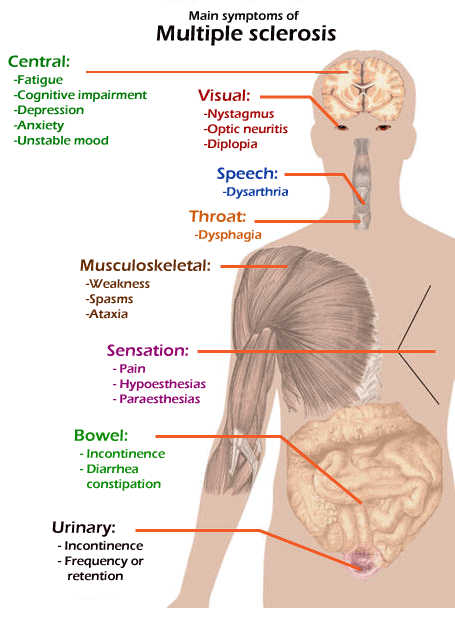What is the full form of MS in Medical
MS: Multiple Sclerosis
MS stands for Multiple sclerosis. It is also defined as scars in multiple areas. It is a persistent condition that damages the optic nerves, vertebral column, and brain. It can result in a wide range of symptoms throughout the body. It is an acute neurological condition of the central nervous system (CNS). The immune system of an individual who suffers from such an autoimmune disorder attacks healthy tissue similarly to how it attacks a virus or bacteria.
The myelin sheath, which surrounds and protects nerve fibres, is attacked by the immune system in MS, resulting in inflammation. Nerve impulses need myelin to transfer electrical signals quickly and effectively.
When the myelin sheath fades or is destroyed in various areas, a scar, also known as sclerosis, is formed. These areas are often referred to as plaques or lesions by doctors. The areas which are mainly affected by such condition are:
- The cerebellum, which coordinates movement and regulates balance, is derived from the brain.
- The spinal cord, optic nerves, and white matter are in some brain regions.
- As more nodules are formed, nerve fibres can be broken or damaged. As a consequence, signals from the brain do not transport smoothly to the accurate nerve; therefore, the body cannot perform particular tasks.

Symptoms
The following are the most commonly occurring symptoms of MS:
- Muscle weakness can happen due to a lack of stimulation induced by nerve damage.
- A pins and needles sensation that can affect the facial expression, body, shoulders, and feet is one of the early symptoms of MS.
- Lhermitte's indication happens when an individual moves their neck and starts to feel a shock.
- Another symptom is when an individual has dif?culties emptying their bladder, needs to urinate regularly, or suddenly undergoes an uncontrollable compulsive disorder called bloating due to loss of bladder control.
- Constipation can cause faecal obstruction.
- MS can cause individuals to walk differently because of muscle pain, balance issues, drowsiness, and tiredness.
- Demyelination and nerve cell damage in the brain can result in emotional changes.
- Multiple sclerosis can make it challenging to focus, plan, learn, evaluate, and perform tasks.
- Pain is a frequent symptom of MS. Neuropathic pain is generated by MS, whereas muscular muscle twitching or tightness can cause localized pain in a particular area.
The following are minor symptom of MS:
- Headaches
- Insufficiency of hearing
- Respiratory or breathing difficulties
- Seizures
- Speech problems
- Ingesting problems
- There is also an increased risk of urinary infections, decreased activity, and movement loss. These can have an influence on a person's job and social interactions.
- In the advanced stages, people may experience changes in their sensations and thinking, as well as thermal sensitivity.

Causes
- Smokers appear to be at a higher risk of getting MS. They also have more neurological symptoms and deformation than non-smokers.
- Exposure to viruses such as Epstein-Barr virus or mononucleosis may start increasing an individual's likelihood of developing MS; other viruses that might be involved include herpes simplex virus type 6 and pneumoniae.
- MS is more common in individuals who do not get sufficient bright sunlight, which the body requires to produce vitamin D. A few experts believe that inadequate levels of vitamin D can impair activity of the immune system.
- The body uses vitamin B to make myelin. The latter vitamin deficiency could increase the risk of neurodegenerative disorders such as MS.
Diagnosis
- MRIs of the brain and spinal cord, which could indicate lesions, and spinal fluid examination, which could find protein or antibody that supports a diagnosis of multiple sclerosis or antibodies that point to a past illness
- A test known as an evoked potential measures electrical activity in response to a stimulus.
Treatment
For the treatment of relapsing types of MS, the Food Drug Administration has given its approval for a list of drugs. These modify how well the immune system functions and therefore have an effect. Some of these may be administered by mouth, injection, or infusion. The drug determines how frequently the person must consume them and whether they should do it at home or not.
The following are some FDA-approved medications. They are divided into 3 major categories.
Injectable medications
- Avonex
- Betaseron
- Copaxone
- Extavia
- Glatiramer Acetate Injection
- Glatopa
- Plegridy
- Rebif
Oral medications
- Aubagio
- Bafiertam
- Dimethyl Fumarate
- Gilenya
- Mavenclad
- Mayzent
- Ponvory
- Tecfidera
- Vumerity
- Zeposia
Infused medications
- Lemtrada
- Novantrone
- Ocrevus
|


 For Videos Join Our Youtube Channel: Join Now
For Videos Join Our Youtube Channel: Join Now










